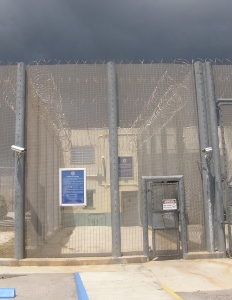Archive for June, 2012

Charges mount against former insurance manager
(CNS): David Keith Self, who is accused of stealing as much as $1 million from a Cayman incorporated insurance company, is struggling to get legal aid to pay for legal representation, despite losing his job and being remanded at HMP Northward. The former insurance manager was originally charged by the crown with only two counts of theft amounting to around $125,000, however the court heard Friday that the counts against the George Town man have increased to 18 and include a variety of offences relating to much greater sums of money and severity of accusations leaving Self exposed to a greater period of incarceration should he be convicted.
Self has not yet entered a plea in connection with the mounting charges against him relating to allegations that he misappropriated and stole cash while employed as an insurance manager with Monkton Insurance Services Ltd. Self was said to be the sole director at the firm and is accused of numerous financial crimes, including obtaining money by deception, false accounting and possession of criminal property as well as various counts of theft, including one for as much as $675,000.
Ben Tonner of Samson & McGrath wh,o is representing Self, said that given the increasing severity of the charges against his client he would be making another application for legal aid as the new charges amounted to schedule offences. Although details of the allegations against Self have not yet been revealed in the courts, liquidators for Self’s former firm filed a petition in Grand Court in April to wind up the business, described as “hopelessly insolvent”.
Gordon MacRae and Gwynn Hopkins of Zolfo Cooper (Cayman) Limited, the liquidators of the company, claim Self had wrongfully diverted cash from the insurance firm and its clients, which he used for unauthorized investments and personal expenditure.
Monkton Insurance Services was incorporated in Cayman in 1997 and is regulated by the Cayman Islands Monetary Authority, which appointed controllers over the company in February stating thatSelf "was not a fit and proper person to hold the office of director", the liquidators said in the court documents.
Self was arrested on 21 February and charged in March, when he was remanded to Northward Prison.

Drivers warned over new Frank Sound school zone
 (CNS): Drivers are being alerted to the creation of a new school zone along Frank Sound Road in North Side in preparation for the opening of the new Clifton Hunter campus. The National Roads Authority (NRA) will start work this week on the zone to accommodate school traffic and ensure the safety of students when the school opens at the end of August. The school zone will include a 970 ft turning lane as well as the smoothing of the kink in the road to allow for better visibility. “School zones are an essential safety feature at our schools," said NRA Transportation Planner Marion Pandohie.
(CNS): Drivers are being alerted to the creation of a new school zone along Frank Sound Road in North Side in preparation for the opening of the new Clifton Hunter campus. The National Roads Authority (NRA) will start work this week on the zone to accommodate school traffic and ensure the safety of students when the school opens at the end of August. The school zone will include a 970 ft turning lane as well as the smoothing of the kink in the road to allow for better visibility. “School zones are an essential safety feature at our schools," said NRA Transportation Planner Marion Pandohie.
“It is designed primarily to slow down traffic, giving drivers more time to recognize and react to situations requiring slowing, stopping or evasive action,” the NRA official added.
A school zone begins at the School Speed 15 MPH when flashing sign and ends at the End School Zone sign.
“With the school opening, the Frank Sound Road will also see an increase in traffic. In this regards, lower speed limits on the surrounding roads will increase safety of students and parents, especially at pick up and drop off times,” Pandohie explained.
The new school zones were set in place in coordination with the Ministry of District Administration, Works, Lands and Agriculture, the police and the schools. The project is set to be completed prior to the school’s opening.

Bill ‘attacks’ criminal lawyers
 (CNS): Members of the Criminal Defence Bar Association (CDBA) have described government’s proposed legal aid bill as an unjustified attack on lawyers representing people facing criminal charges in the local courts, and in particular those doing legal aid work. The association believes that the bill could make things worse when it comes to trying to tackle the mounting legal aid issue for a number of reasons. It also warned that having unqualified and uninsured lawyers from across the legal profession doing pro bono work representing people charged with crimes could present significant human rights problems.
(CNS): Members of the Criminal Defence Bar Association (CDBA) have described government’s proposed legal aid bill as an unjustified attack on lawyers representing people facing criminal charges in the local courts, and in particular those doing legal aid work. The association believes that the bill could make things worse when it comes to trying to tackle the mounting legal aid issue for a number of reasons. It also warned that having unqualified and uninsured lawyers from across the legal profession doing pro bono work representing people charged with crimes could present significant human rights problems.
In the submission, as part of the draft legal aid bill's discussion period, the CDBA president, on behalf of the entire membership, points to a long list of problems with the draft bill. John Furniss states that lawyers from across the various legal disciplines will not be in a position to assist with criminal defence cases and limiting legal aid lawyers’ work load will create far more problems than it solves.
The association also points to the unfairness of paying legal aid lawyers for only 45 minutes for every hour they work in court and notes that the bill will do nothing to address the existing shortage of qualified criminal lawyers practicing on island that are willing and able to do legal aid work.
Although the association welcomes some elements of the law, which was made public last month, Furniss, who says the CDBA was not consulted about the draft bill before it was published, has pointed to dozens of problems that will make the bill unworkable. He said the cap on public defence work is designed to share work among attorneys but fails to recognize the fact that a pool of such lawyers simply does not exist.
“The Cayman Islands already suffers from a chronic shortage of attorneys willing and able to undertake publicly funded work,” he wrote in the submission paper, adding that such a cap could be the death knell for the legal aid system.
Although the Cayman Islands is home to significant number of lawyers (more than five hundred), most of them specialize in offshore finance and other specialist commercial work. Only a very small percentage of local lawyers are practicing in criminal work and no more than a dozen of those are willing to do the critical legal aid work.
In an effort to try and address the escalating costs of legal aid to the public purse, brought about by the increase in serious crime for which defendants must have access to free legal representation, the government proposed a plan to force lawyers to do pro bono work. But, Furniss warns, this creates significant dangers when they must take on work for which they are not qualified and, more importantly, insured.
He said that the proposed pro bono scheme, which attorneys can avoid if they pay a fee of $2500, amounts to a tax on lawyers and questions why they should be the only people in society responsible for funding the legal aid system when the issue is a much wider one.
All of the lawyers undertaking legal aid work already do a considerable amount of pro bono work as a matter of course but many more will simply not be a position to do so without breaking the lawyer’s code of conduct or creating human rights issues.
On behalf of the CDBA, Furniss calls on government to re-think several of the clauses in the bill in order to ensure that the system continues to work and those charged with crimes continue to have access to proper representation, which will be legally required under the Bill of Rights that will be implemented this November.
See CDBA submission below.

Police seek missing laptop in suicide enquiry
 (CNS): The RCIPS are appealing to the public for help in tracing a missing laptop which belonged to Lija Godenzi (43) who was found dead in her apartment in April. Police have confirmed that there are no suspicious circumstances surrounding her death but during the course of conducting enquiries into her last movements, officers established that her laptop is missing. (Smiliar to that at left) Godenzi picked up her Apple Macbook Pro from Cyber Joes in Grand Harbour sometime after 3pm on Monday 2 April. Despite extensive enquiries with friends and family there is no trace of her laptop.
(CNS): The RCIPS are appealing to the public for help in tracing a missing laptop which belonged to Lija Godenzi (43) who was found dead in her apartment in April. Police have confirmed that there are no suspicious circumstances surrounding her death but during the course of conducting enquiries into her last movements, officers established that her laptop is missing. (Smiliar to that at left) Godenzi picked up her Apple Macbook Pro from Cyber Joes in Grand Harbour sometime after 3pm on Monday 2 April. Despite extensive enquiries with friends and family there is no trace of her laptop.
Detectives say they are keen to speak to anyone who may have seen Godenzi after she left Cyber Joes on Monday 2 April. They would also be keen to speak to anyone to whom she may have given the laptop in the days prior to her death. When she picked up the laptop Mrs. Godenzi was possibly wearing shorts and a tank top. She then entered her sky blue Kia Carnival license plate number 131 044 and drove towards her home.
Anyone who has any information regarding the whereabouts of the laptop is asked to contact George Town police station on 949-4222.

Brac dump fire lasts all weekend
 (CNS): The fire station on Cayman Brac enlisted the help of local company Raymond's Heavy Equipment to fight a fire at the landfill on the south side of the island, which blazed for roughly 48 hours. Fire officers spent the weekend tackling a persistent fire that started around 8pm Friday and was finally extinguished at 7:30pm on Sunday. On Saturday afternoon heavy equipment operator Raymond Scott used his backhoe to dig a trench in the vegetation to act as a firewall and then spread the garbage out so that the officers could douse the flames.
(CNS): The fire station on Cayman Brac enlisted the help of local company Raymond's Heavy Equipment to fight a fire at the landfill on the south side of the island, which blazed for roughly 48 hours. Fire officers spent the weekend tackling a persistent fire that started around 8pm Friday and was finally extinguished at 7:30pm on Sunday. On Saturday afternoon heavy equipment operator Raymond Scott used his backhoe to dig a trench in the vegetation to act as a firewall and then spread the garbage out so that the officers could douse the flames.
The cause of the fire is not known.

CIFA offers novice course for referees
 (CNS): The Cayman Islands Football Association (CIFA) in collaboration with the CIFA Referees' Department will be conducting a Beginners Referee Course from 19 — 28 June 28. Referees and officials perform a vital role in the global sport of football, ensuring safety, fairness, equality and enjoyment. With the growth in football's popularity, particularly among women and youth, the demand for officials is always increasing. “Joining the ranks of a CIFA referee can be your gateway to the FIFA international panel of referees,” a spokesperson for the association said.
(CNS): The Cayman Islands Football Association (CIFA) in collaboration with the CIFA Referees' Department will be conducting a Beginners Referee Course from 19 — 28 June 28. Referees and officials perform a vital role in the global sport of football, ensuring safety, fairness, equality and enjoyment. With the growth in football's popularity, particularly among women and youth, the demand for officials is always increasing. “Joining the ranks of a CIFA referee can be your gateway to the FIFA international panel of referees,” a spokesperson for the association said.
The beginners Referee Course is open to all interested men and women from the age of sixteen and who maintain a reasonable fitness level.
Classroom sessions will be administered on 19-26 June with revision scheduled for 27 June. The theory examination will be conducted on Thursday 28 June. All sessions are scheduled to run between 6:30 p.m. and 8:30 p.m. each day at the George Town Primary School.
For registration please send an e-mail to alfredo.whittaker@cifa.ky or marcos.tinoco@cifa.ky. You can also call: 949-5775/926-1868 or contact any CIFA referee.

How many worms are in that can?
The role of senior civil servants, and in particular whether they are held accountable, is a question that always surfaces, especially during a crisis. Mr Duckworth’s recent response to a commentary regarding party politics contained a reference to the role of the Financial Secretary that in effect opens a can of worms that should be addressed.
I will assume that Mr Duckworth’s reference to “the Financial Secretary’s radical reassessment after the 2009 election” is not meant to intentionally open this can of worms. At the same time, his reference does remind me of the suggestion, usually made by the PPM, that the FS’ fiscal reassessment post-election was not just a case of an error or incompetence but that it may have been politically motivated. This has been suggested often enough publicly to address it here.
I will try not to make too much of a judgment here about the FS or his performance, but I'm not so convinced that his actions are as political as they are sometimes made out to be and here's why:
First, it should go without saying thatthe FS is accountable to the public. So, for example, when we witness financial mismanagement, poor government budget forecasts, a surplus pronouncement one day and deficit the next, some of that blame should be placed squarely on this senior official and his team.
But elected officials should also be held accountable for these mishaps and we should not buy the political cop-out that elected ministers have no control over the civil service.
Irrespective of the constitutional position that is used when they wish to run away from public criticism, ministers in particular do have a material element of day to day control over what goes on within their portfolio. They should not be allowed to claim victory and political points when an initiative goes well and yet say “we are not responsible” when things go wrong. The truth is if they are in control enough to claim credit then they are in control enough to also take the blame.
When we focus on the role of the FS post the 2009 election, we should also recall his role (and the role of other financial secretaries) in the years before the 2009 election as well. We might recall that for years we have accepted the practice of having unaudited financials used as the main document by which the public assesses how the country is doing (since the audited financials were usually anywhere from several months to a year behind).
We should also accept that the FS and his team have always carried out projections and that those projections have frankly not always been accurate. In other words, these errors are nothing new.
We should also remind ourselves that this is the same FS who gave the go-ahead, according to the PPM, for their projects and they had no reason to doubt his judgment then. And finally, the PPM should remind itself that for four years straight they accepted his work, for better or for worse, as being credible enough to approve the annual budget in the Legislative Assembly. Same goes now for the UDP.
If all we were saying was that the FS and his team made some serious errors and one of those errors was that they got the size of the deficit wrong in 2009, that would be a reasonable opinion for anyone to have. But what has been suggested (and strongly implied by the PPM on occasion) is that he first suggested a deficit of one size and then “all of a sudden” projected that the deficit would be 81 million post-election day (with the emphasis being on ‘post-election day’).
I, for one, have also lost confidence in these numbers, but we should also consider the direct role of elected officials because that contributes significantly to the problem. Here is how that part of the process works:
A group of politicians and several senior civil servants from the finance department get into a room to finalise the annual budget. The officials provide their reasons for the projections. The politicians come up with some other ways to earn revenue or claim to commit to reduce expenditures further (i.e. they don’t like the projections). The actual projections agreed are based on the unsubstantiated claims and proposed actions of the government as promised by the politicians. The senior officials and his team then get blamed for publishing an erratic budget.
If there is anything that shows just how elected officials can muddy the waters and their true influence/control (yes, I said control) over civil servants, it is the above example, which does reflect reality on many, many occasions. But what may surprise you is to find out how often this occurs and for how many years it has been going on.
All of this is to say this: feel free to criticise the FS and the current “system of financial management” all you want, but it is highly unlikely that the reasons for the financial debacle are mainly due to errors or incompetence of a few senior officials, or worse that they are simply politically motivated. This way of looking at things is equally alarming, whether we view the system under the PPM or the UDP. The FS and his team have been a constant in this process for both groups. In other words, whether you believe he is very competent or not that good, he has been the same. So who really then is to blame? Is it not the politicians themselves?
Whether it is the failure of our elected officials to heed warnings from senior civil servants or their political maneuvering to get the numbers they prefer, the truth behind this story has a lot more to do with the actions of the politicians (both present and past) than any of them would have us believe.
Ironically, if we were to start looking deeper into this issue we would likely need an accountant to help us assess the overwhelming number of worms in that can.

Civil servants encouraged to serve without fear
(CNS): The deputy governor told a group of new public sector workers to serve without “fear or favour” at an orientation sessions for the new civil servants. Franz Manderson encouraged the new recruits to uphold a strong work ethic and to deliver high standards of customer service as well as take care to serve without fear or favour. “The customer might not always be right, but the customer always deserves to be treated fairly and with respect,” he said at the first of a new staff orientation initiative, spearheaded by Manderson and developed by the Portfolio of the Civil Service, to give new staff an idea of the organisation they have joined, what will be expected from them and how they can be successful as a civil servant.
“The objective of the new orientation sessions were to build the confidence of the new employee in the organization, to make the new employee become a productive one by reducing his/her anxiety that impedes ability to learn to do the job and also to create the feeling of belongings and loyalty with in the new employee,” Manderson said.
The day-long session covered a long list of need-to-know subject areas. Topics included public service values and code of conduct, government structure, civil servants’ responsibilities under the Gender Equality, Anti-Corruption and Freedom of Information laws and the Cayman Islands Constitution’s Bill of Rights, Freedom and Responsibilities. New employees were also briefed on performance and career advancements in particular through the Civil Service College.
The new public sector employees also herd from their top boss the governor who urged them to take full advantage of the orientation session as it was an introduction to a great career. “Working in the public sector is a very unique opportunity to serve your country,” Duncan Taylor added.

Motorcyclist and passenger hurt in late night crash
(CNS): Two people are being treated at the Cayman Islands Hospital for serious injuries after a smash involving a car and a motorcycle. Police said the collision occurred at about 11:56pm on Saturday (9 June) night at the junction of Crewe Road and Smith Road in George Town. Police said that a Mitsubishi car, travelling west along Crewe Road, made a right turn in the vicinity of Crewe Road and Smith Road junction, when it smashed into a motorcycle which was heading east coming from Smith Road direction. Both people on the motorcycle were conveyed to hospital, where their condition was listed as serious. The driver of the car sustained no injuries.
Officers from the Royal Cayman Islands Police Service are appealing for any witnesses that may have been in the area at that time of the collision. Anyone with information is asked to call George Town Police Station at 9494222.
Meanwhile, three cars were involved in a crash close to of Club 7 on the West Bay Road on Saturday afternoon in which three people were taken to hospital with non-life threatening injuries.

Northward inmate denies GBH on prison guard
 (CNS): Dean Bailey pleaded not guilty on Friday to charges of grievous bodily harm in connection with an assault on a prison officer earlier this year. Bailey is accused of biting off the ear of a guard at HMP Northward during an incident at the prison. The serving inmate will face a judge alone trial but a date has not yet been fixed. The assault took place early on the morning of 16 March, when the officer had his ear partially bitten off by Bailey during an altercation at the prison, the prosecution contends. The guard was treated for his injuries at George Town hospital.
(CNS): Dean Bailey pleaded not guilty on Friday to charges of grievous bodily harm in connection with an assault on a prison officer earlier this year. Bailey is accused of biting off the ear of a guard at HMP Northward during an incident at the prison. The serving inmate will face a judge alone trial but a date has not yet been fixed. The assault took place early on the morning of 16 March, when the officer had his ear partially bitten off by Bailey during an altercation at the prison, the prosecution contends. The guard was treated for his injuries at George Town hospital.